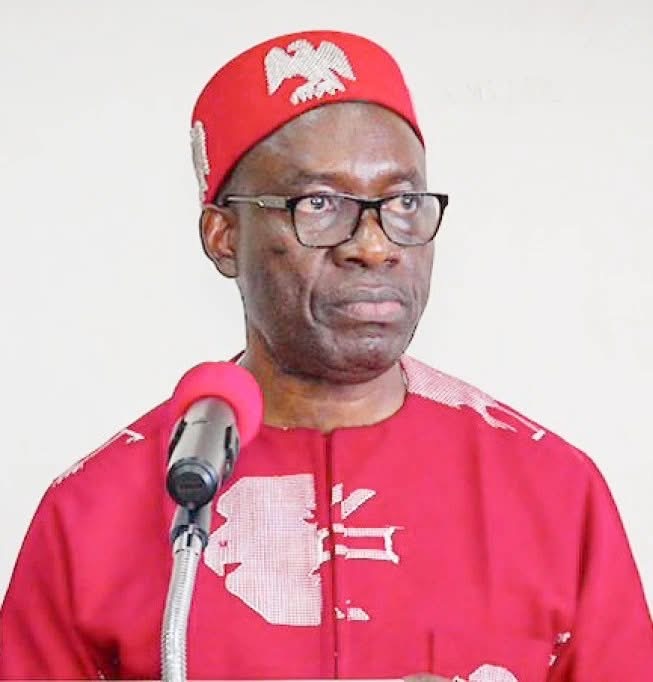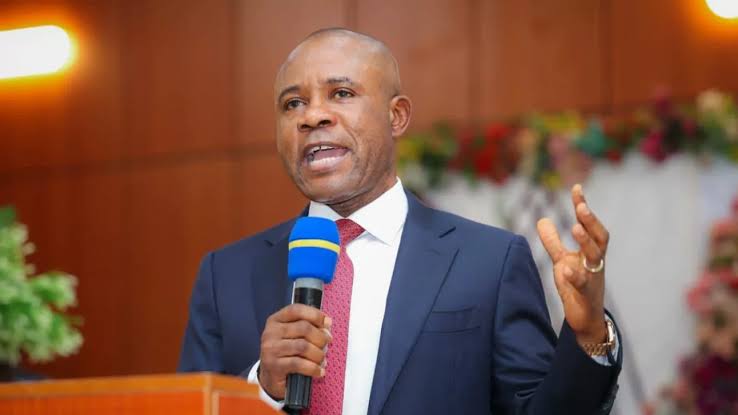Health
Nigeria spends N8bn to import vaccines from USA, Europe annually – WAPCMLS
Published
6 months agoon
By
Ekwutos BlogThe West Africa Post Graduate College of Medical Laboratory Science (WAPCMLS) has stated that the Nigerian government spends N8 billion annually to import vaccines from the USA and Europe.
The General Secretary/Registrar of the College, Dr Godswill Okara, disclosed this at the 4th induction/oath-taking ceremony of the 2023/2024 qualified graduates of Medical Laboratory Science at Edo State University, Uzairue, in Etsako West Local Government Area.
Okara said the amount was spent to import vaccines from Belgium, India, the USA, France, Indonesia, Russia, Singapore, Denmark, South Korea, Germany, and the UAE annually.
He, however, called on the Federal Government to, as a matter of priority, support laboratory systems by developing a national laboratory policy within the national health development plan that would guide the implementation of a national strategic laboratory plan.
“To strengthen healthcare services in Nigeria, the Federal Government must unveil the National Medical Laboratory Service Policy to address the challenges confronting health services across the federation.
“The policy must serve as a strategic framework to strengthen the laboratory systems across the country,” he said.
Okara, who was the guest speaker at the event, stated that medical laboratory scientists in Nigeria must rise to the challenge of producing human vaccines and biologicals in the country.
The General Secretary/Registrar, WAPCMLS, who spoke on the topic, “Expanding Horizons: The Evolving Role of Medical Laboratory Scientists in Global Health and Innovation Post-COVID-19,” opined that medical laboratory scientists are indispensable in the fight against diseases and in protecting human health and life.
“The medical laboratory scientist is at the heart of accurate diagnosis of diseases, monitoring of treatment and management of patients, prevention, surveillance, and control of diseases locally and globally.
“Education and training hold the key to resolving the myriad of health problems facing Africa and the world,” he said.
“Medical laboratory scientists constitute a key profession in the medical fraternity and also form the backbone of medical research.
“Laboratory scientists provide prompt and accurate diagnoses in most conditions, thus allowing scientific and effective treatment to be instituted,” he added.
He noted that medical laboratory scientists around the world have been delivering on testing, accelerating research, and innovating at an unparalleled scale, which has led to the development of new diagnostics, vaccines, and therapeutics after COVID-19.
He posited that biomedical laboratory scientists have worked around the clock dealing with the immense numbers of samples that have needed testing.
“If there is something we have learned, it is that laboratory systems and medical laboratory scientists are of vital importance to national and global preparedness, and this should become a priority investment moving forward,” he said.
In his remarks, the Acting Vice Chancellor of the university, Prof Dawood Egbefo, advised the inductees to be professional in performing diagnostic tests on patient samples, analyzing results, and ensuring accuracy through quality control measures.
Earlier, Prof Tosan Erhabor, Registrar/CEO of the MLSCN, who administered the oath to the inductees, urged them to always adhere to the rules of the profession.
Erhabor, who was represented by Dr Chris Mbata, noted that the rules are ethical guidelines binding on every laboratory scientist in Nigeria.
You may like


NFF denies owing late Christian Chukwu amid social media claims


VP KASHIM SHETTIMA APPLAUDS GOV ENO’S INVESTMENT IN HUMAN CAPITAL DEVT.


GOV. OTU HAILS TINUBU AS CONSTRUCTION OF LAGOS-CALABAR COASTAL HIGHWAY BEGINS IN CROSS RIVER


PRESIDENT TINUBU CONDEMNS LATEST ATTACK IN PLATEAU, CHARGES GOVERNOR MUTFWANG WITH RESOLVING UNDERLYING COMMUNAL ISSUES


Wike hails 95% implementation of FCT 2024 budget, unveils key projects


Benue Govt moves to block Peter Obi’s visit amid Alia’s defection rumours
Health
We must stop contaminating our rivers and streams in the name of ‘odinani’ (tradition)—- Gov Chukwuma Soludo
Published
2 days agoon
April 13, 2025By
Ekwutos Blog
In a recent address to All Progressives Grand Alliance supporters in Awka, Anambra State Governor Chukwuma Soludo raised concerns about pollution of local streams and rivers by native doctors during rituals. He stated, “We must stop contaminating our rivers and streams in the name of ‘odinani’ (tradition). Many depend on that water for drinking and cooking.”
According to Daily Trust, Governor Soludo urged practitioners to be responsible, saying, “If you must perform rituals, use a container—like a bucket—and carry out your practices there. Do not pollute our public water sources.” He emphasized that polluted water can lead to serious health issues, declaring that “we do not want that for our communities.”
He addressed the backlash from a crackdown on native doctors suspected of criminal behavior: “I am not targeting legitimate traditional worshipers but those who defraud and deceive people.” His aim is to eliminate fraudulent actors while respecting cultural practices.
He highlighted the need for balance: “We can embrace our traditions while ensuring the safety and health of our communities.”
Health
NAFDAC Begins Gradual Reopening of Shops at Ogbo-Ogwu Drug Market in Onitsha
Published
4 days agoon
April 11, 2025By
Ekwutos Blog
The National Agency for Food and Drug Administration and Control (NAFDAC) has commenced the gradual reopening of shops at the Ogbo-Ogwu drug market in Onitsha.
This development follows the agency’s closure of the market on February 10, 2025, due to concerns over the sale and distribution of counterfeit, unregistered, and substandard drugs.
The unsealing exercise is being led by a Deputy Director of NAFDAC, Mr. Tunji Omoyemi.
According to NAFDAC, traders whose shops meet the required safety and documentation standards are being cleared to resume business operations.
Addressing the traders, the market chairman, Mr. Ndubuisi Chukwulota, urged full cooperation with the agency to facilitate the swift resumption of commercial activities.



Credit: Anambra Broadcasting Service
Health
“We don’t train you and after spending all that money you leave our healthcare facilities” Gov Mbah begs nurses not to Japa
Published
4 days agoon
April 11, 2025By
Ekwutos Blog
Enugu State Governor, Peter Mbah has appealed to nursing students in the state not to leave the state after graduation to curb brain drain in the state’s health sector.
The governor made the appeal during the 2024/ 2025 Maiden Matriculation Ceremony of the Nursing College, Enugu on Thursday, April 10.
He urged the students to consider the huge resources the state was committing in training nursing and midwifery students in the state and give back to the state after graduation.
Mbah, represented by the Secretary to the State Government (SSG), Prof. Chidiebere Onyia, said “japa syndrome” was completely against the policy of the state, who had been spending reasonable amount in training them.
“We don’t train you and after spending all that money in infrastructure and the first opportunity you get you leave our healthcare facilities.
“One thing we are very particular is how we improve the service conditions so that when you go through the effort of getting your certificate, you don’t leave our state.
“That is why we are training beyond just academics so that you see that this is service and if any of you can go back to our budget in 2024 and 2025, the highest investment is in education and health,” Mbah said.

NFF denies owing late Christian Chukwu amid social media claims

VP KASHIM SHETTIMA APPLAUDS GOV ENO’S INVESTMENT IN HUMAN CAPITAL DEVT.

GOV. OTU HAILS TINUBU AS CONSTRUCTION OF LAGOS-CALABAR COASTAL HIGHWAY BEGINS IN CROSS RIVER
Trending

 Trending6 months ago
Trending6 months agoNYA demands release of ‘abducted’ Imo chairman, preaches good governance
- Business6 months ago
US court acquits Air Peace boss, slams Mayfield $4000 fine

 Politics6 months ago
Politics6 months agoMexico’s new president causes concern just weeks before the US elections
- Entertainment6 months ago
Bobrisky transferred from Immigration to FCID, spends night behind bars
- Entertainment6 months ago
Bobrisky falls ill in police custody, rushed to hospital

 Politics6 months ago
Politics6 months agoRussia bans imports of agro-products from Kazakhstan after refusal to join BRICS

 Politics6 months ago
Politics6 months agoPutin invites 20 world leaders
- Politics1 year ago
Nigerian Senate passes Bill seeking the establishment of the South East Development Commission.

